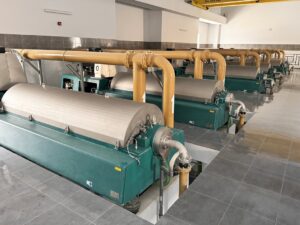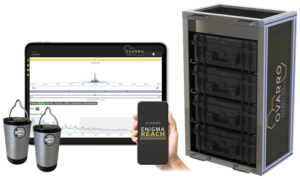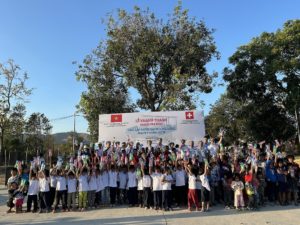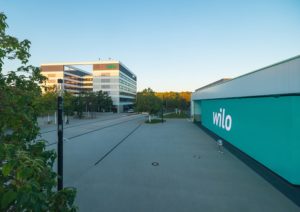Networking, Cooperation, Investment: Instruments for the Exploration of International Water Markets
At the 6th annual conference of German Water Partnership, experts from industry, politics and science discussed demands and market opportunities in international water management.
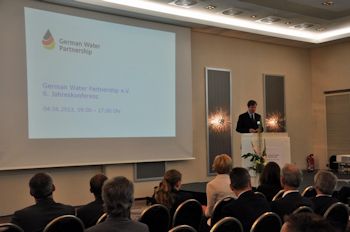
6th annual conference of German Water Partnership (Image: GWP)
In his opening speech Chairman of the GWP Board Michael Beckereit emphasized that during the last five years GWP has become firmly established as the international face of German water management and research. The network had considerably advanced the positioning of the German water sector as a contact for challenges in water management. Numerous solutions for worldwide water problem had already been found, flanked by politics, said Beckereit.
On behalf of the Minister of State Cornelia Pieper, Hinrich Thölken, Division Chief Climate and Environmental Foreign Policy, Sustainable Economy, welcomed the persons present and underlined that above all water is a topic of foreign politics: water could be the reason for conflicts between people or states but also be the starting point for intensifying bilateral or regional cooperation. The ministry of foreign affairs considered transboundary water cooperation an essential element of preventative foreign and security policy. Against the background of increasing pressure on the water resources the topic would more and more be part of the international agendas.
Within the framework of the conference programme the different challenges of water management were examined: during a podium interview with the main topics capacity development, water and energy, operator know-how, industrial water management and exploration of new markets for small and medium enterprises, successful examples of cooperation on the water sector were presented, interfaces were identified and prospectives and requirements for improved cooperation were formulated. For instance a project aiming to increase the energy efficiency of the drinking water supply in Jordan made clear that measures of capacity development are necessary to generate sustainability. Further, various possibilities and instruments to explore new international markets were discussed: Christian Tippelt from the federal ministry of economics and technology presented the market exploration programme by the ministry that provides special opportunities for small and medium enterprises to get in contact with local decision makers and prospective customers during business delegation journeys. Apart from the necessity of measures of capacity development for sustainable water management capacity development can act as a catalyst for entering new markets.
During five round-table discussions dedicated to different regions, GWP members, cooperation partners and guests from politics and industry discussed the current challenges of water management in the respective region:
Improving structures of the water market in southern Africa
The round table Africa examined opportunities of collaboration and instruments to explore new markets. Christian Günner of Hamburg Wasser presented a project for sustainable water supply and waste water disposal in Dar es Salaam, which is jointly undertaken by municipal operators. The participants thoroughly discussed the stumbling blocks and success factors of such a project. Besides, Lea Heidemann of the German Chamber of Industry and Commerce presented opportunities and barriers on the markets in southern Africa. For example she spoke about the lack of important blanket information for analyses but at the same time remarked that the sector is being structured more and more.
China as a motor for innovation
The round-table discussion on the Asia-Pacific region explored the framework conditions for economic involvement in developing or newly industrialised countries and threw light on approaches already successfully adopted in the region. For example Reinhold Ollig, Assistant Head to a department of the Ministry for Education and Research, introduced offers of the Chinese government in the context of setting up an innovation park within the Zhangjiang Hi-Tech Park in Shanghai. Based on the close Chinese-German cooperation in the fields of innovation, education and also water, China particularly supports the establishment of German companies by well-directed business reliefs and subsidies.
Trans-sectoral collaboration in North America
Market opportunities and business development as well as trans-sectoral collaboration and networking were the main topics at the round table North America. Together with Canadian guests and partners the participants discussed the challenges and needs and the resulting opportunities for cooperation and initiations of business. Rick Goldring, Mayor of the City of Burlington, Ontario, explained opportunities and introduced instruments for successful cooperation of the German water sector in Canada.
Decentralised water supply for remote regions of South America
South America as an affluent water market: the round table focused on current opportunities and challenges of the local water market, on offers of the German ministries for development cooperation and education and research but also on favourable framework conditions.
Petra Ruth, Advisor for Development Cooperation to the Berlin Chamber of Industry and Commerce, presented instruments of collaboration with local entities for the German water sector and examined starting-points with GWP.
Jürgen Hößler of Grünbeck illustrated factors and approaches by presenting a project for the installation and introduction of decentralised water purification in Brazil, which was realised by a public-private partnership.
South-east Europe: a region between development cooperation and European integration
The round table South-East Europe examined the local situation in this region between development cooperation and the European integration. The emphasis lay on the requirements and aims of strategic collaboration in south-east Europe: can south-east Europe be a model region for a common concept of German actors? Among other things Željka Hak of the Croatian Chamber of Industry and Commerce spoke about opportunities for the German water sector with regard to Croatia’s joining of the EU in July this year. Projects in the field of water supply and waste water disposal are high on the agenda. Dr Heike Burghard, Deputy Head of the Regional Section South-East Europe within GWP, illustrated the possibilities of using measures of capacity development as instruments for entering new markets. One important means is the networking with local actors and thus identifying and advancing at an early stage.
Individual solutions to individual challenges
The discussions showed that German Water Partnership is on the right track and is able to offer individual approaches to the solutions for sustainable water management worldwide. The participants in the conference also used the opportunity to talk to decision makers and clients, to initiate business and exchange experience.
Source: German Water Partnership e.V.


